Do French Bulldogs Get Aggressive?
Thinking about adding a French Bulldog to your family? But wait, what about their aggression levels?
Don’t worry, I’ve got you covered. French Bulldogs are irresistibly cute with their smooshed faces and adorable bat-like ears.
However, there’s this lingering belief that they might have a bit of a temper compared to other breeds. Well, today we’re going to tackle this burning question head-on.
So grab your favorite drink, get cozy, and let’s dive right in.
What Causes Aggression in French Bulldogs?
Contents
- 1 What Causes Aggression in French Bulldogs?
- 2 Fear-Based Aggression in French Bulldogs
- 3 Territorial Aggression in French Bulldogs
- 4 Lack of Socialization and Aggression in French Bulldogs
- 5 Health Issues and Aggression in French Bulldogs
- 6 Understanding Normal Canine Communication vs. Aggressive Behavior
- 7 Seeking Professional Help for Aggressive French Bulldogs
- 8 Training and Positive Reinforcement Techniques to Manage Aggression
- 9 Conclusion
French Bulldogs are widely known for their friendly and affectionate nature. However, like any other breed, French Bulldogs can exhibit aggression under certain circumstances. In this comprehensive guide, we will explore the various factors that can contribute to aggression in French Bulldogs. Whether you are a current owner or considering adopting a French Bulldog, understanding the causes of aggression is crucial for creating a safe and harmonious environment for both you and your furry companion.
Genetics:
Genetics play a significant role in a dog’s temperament, and some French Bulldogs may have a predisposition towards aggression due to their breeding lines. Responsible breeding practices prioritize temperament and health, which helps produce well-rounded and stable individuals.
Socialization:
Lack of proper socialization during the critical early development stages can contribute to aggressive behavior in French Bulldogs. It is essential to expose them to different people, animals, and environments to learn appropriate social skills. Regular outings to the park, puppy classes, and positive interactions with other animals can greatly reduce the likelihood of aggression.
Training and Discipline:
Inadequate training or inconsistent discipline can lead to behavioral issues, including aggression. Establishing clear boundaries and providing consistent positive reinforcement training is essential for French Bulldogs. Seek professional help from a qualified dog trainer if necessary.
Health Issues:
Health problems such as pain or discomfort can trigger aggression in French Bulldogs. Regular veterinary check-ups are essential to address any underlying medical conditions that may be contributing to aggressive behavior.
Fear and Anxiety:
Fear and anxiety are common triggers for aggression in dogs, including French Bulldogs. They may become aggressive when they feel threatened or unsafe. Identifying and addressing the underlying causes of fear or anxiety is crucial in managing aggression.
Resource Guarding:
French Bulldogs may become possessive over food, toys, or even their owners, leading to aggressive behavior when they perceive a threat to their possessions. Proper training and teaching them to share and relinquish items can help manage this type of aggression.
Hormonal Influences:
Hormonal changes during sexual maturity or intactness can also influence aggression in French Bulldogs. Spaying or neutering them can help reduce hormonal-driven aggression.
Fear-Based Aggression in French Bulldogs
Fear-based aggression in French Bulldogs can stem from a variety of factors. It is important to remember that this behavior is not specific to the breed but rather an individual response to certain situations. Here are some common causes of fear-based aggression in French Bulldogs:
- Lack of Socialization: French Bulldogs that have not been properly socialized from a young age may be more prone to fear-based aggression. Exposing them to different people, animals, sounds, and environments helps them build positive associations and develop confidence.
- Genetics: Some French Bulldogs may have a genetic predisposition towards fear-based aggression. It is important to be aware of the dog’s lineage and any potential behavioral issues that may have been passed down.
- Traumatic Experiences: Dogs that have experienced traumatic events or have been poorly treated in the past may develop fear-based aggression as a defense mechanism. Understanding and addressing these experiences is crucial in managing their aggression.
Signs of Fear-Based Aggression in French Bulldogs
Recognizing the signs of fear-based aggression in French Bulldogs is essential for effective management. Here are some common behaviors to look out for:
- Growling: When a French Bulldog feels threatened or scared, they may growl as a warning sign.
- Barking: Fear-based aggression can also manifest through excessive barking when the dog is feeling fearful or anxious.
- Snapping or Lunging: French Bulldogs may resort to snapping or lunging when they feel cornered or scared.
- Defensive Body Language: Raised hackles, a tucked tail, flattened ears, and a tense posture are all signs of fear-based aggression in French Bulldogs.
Managing Fear-Based Aggression in French Bulldogs
Managing fear-based aggression in French Bulldogs requires a multi-faceted approach. Here are some strategies that owners can implement:
- Early Socialization: Providing your French Bulldog with positive experiences and exposure to various stimuli from a young age can help prevent fear-based aggression. Enroll them in puppy socialization classes and introduce them to different people, animals, and environments.
- Training and Obedience: Teaching your French Bulldog basic commands such as “sit,” “stay,” and “leave it” can redirect their focus and provide them with alternative behaviors when they feel scared or threatened.
- Safe Environment: Creating a safe and secure environment for your French Bulldog is crucial in managing their fear-based aggression. Avoid exposing them to situations that may trigger anxiety or fear, and provide them with a consistent routine and structure.
- Positive Reinforcement: Rewarding calm and non-aggressive behavior with treats, praise, and playtime can help reinforce positive associations and reduce fear-based aggression.
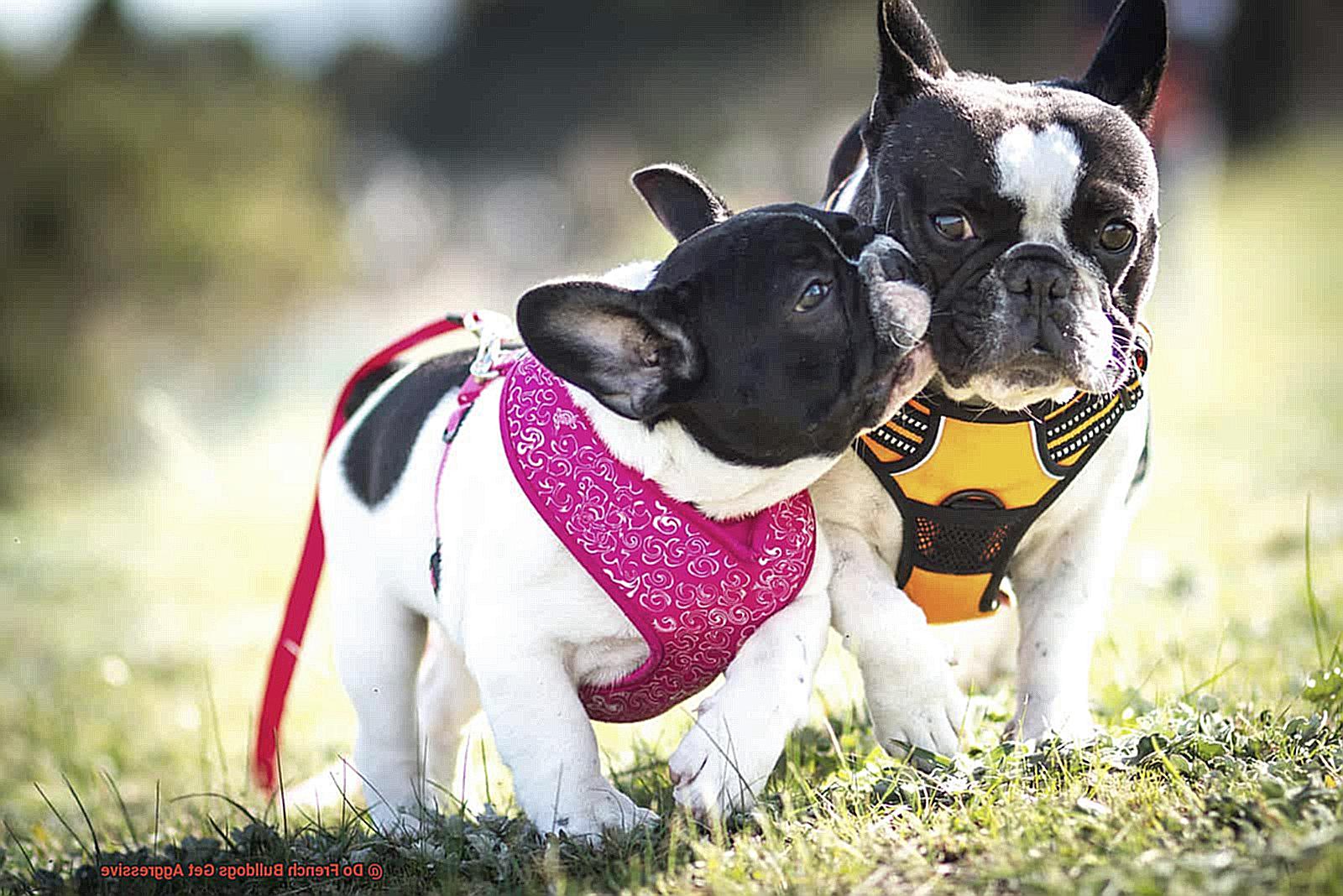
Territorial Aggression in French Bulldogs
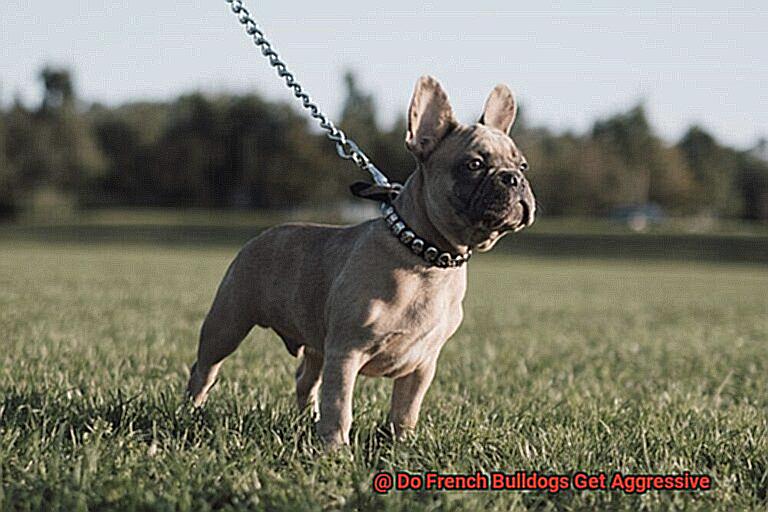
French Bulldogs are known for their friendly and sociable nature, but like any other breed, they can sometimes display territorial aggression. This behavior is rooted in their natural instinct to protect their territory, which can include their home, yard, or even their beloved owner. If you have a French Bulldog that shows signs of territorial aggression, it’s important to understand the causes and find effective solutions to manage this behavior.
Causes of Territorial Aggression
Territorial aggression in French Bulldogs may arise from various factors, including:
- Natural Instinct: French Bulldogs have an innate desire to protect their territory. It’s in their DNA to guard what they consider their domain.
- Lack of Socialization: Insufficient exposure to different environments, people, and animals during the critical socialization period can contribute to territorial aggression.
- Upbringing: A dog’s upbringing plays a significant role in shaping their behavior. If a French Bulldog has not received proper training and boundaries, they may become more prone to territorial aggression.
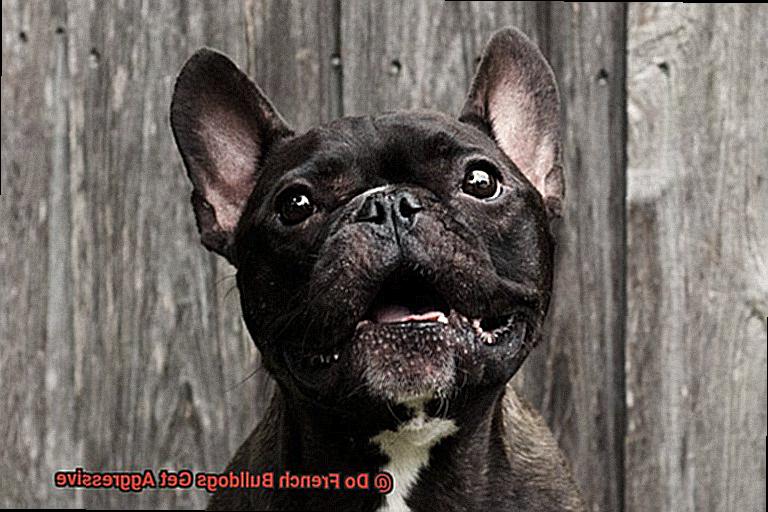
Recognizing Signs of Territorial Aggression
It’s crucial to identify the signs of territorial aggression in your French Bulldog. Some common indicators include:
- Growling: Your furry friend may growl when someone or something enters their perceived territory.
- Barking: Excessive barking is another way French Bulldogs express their territorial instincts.
- Lunging: Your pup might lunge towards intruders or unfamiliar beings who encroach on their territory.
- Biting: In severe cases, territorial aggression can escalate to biting as a means of protecting their space.
Solutions for Managing Territorial Aggression
Thankfully, there are effective strategies for managing and minimizing territorial aggression in French Bulldogs:
- Early Socialization: Introduce your French Bulldog to various environments, people, and animals during their socialization period. This exposure helps them feel more comfortable and less threatened in new situations.
- Training and Obedience: Teach your French Bulldog basic obedience commands such as “sit,” “stay,” and “leave it.” This establishes your role as the pack leader and helps control their territorial behavior.
- Physical and Mental Stimulation: Provide ample exercise and mental stimulation for your furry friend. Regular walks, playtime, and puzzle toys can help alleviate pent-up energy that may contribute to territorial aggression.
- Creating a Safe Environment: Make sure your French Bulldog feels secure in their territory. Provide a designated space for them, such as a crate or a specific room, where they can retreat when feeling anxious or threatened.
- Positive Reinforcement: Reward good behavior with treats, praise, and affection. Positive reinforcement training methods will help reinforce desired behaviors and reduce territorial aggression.
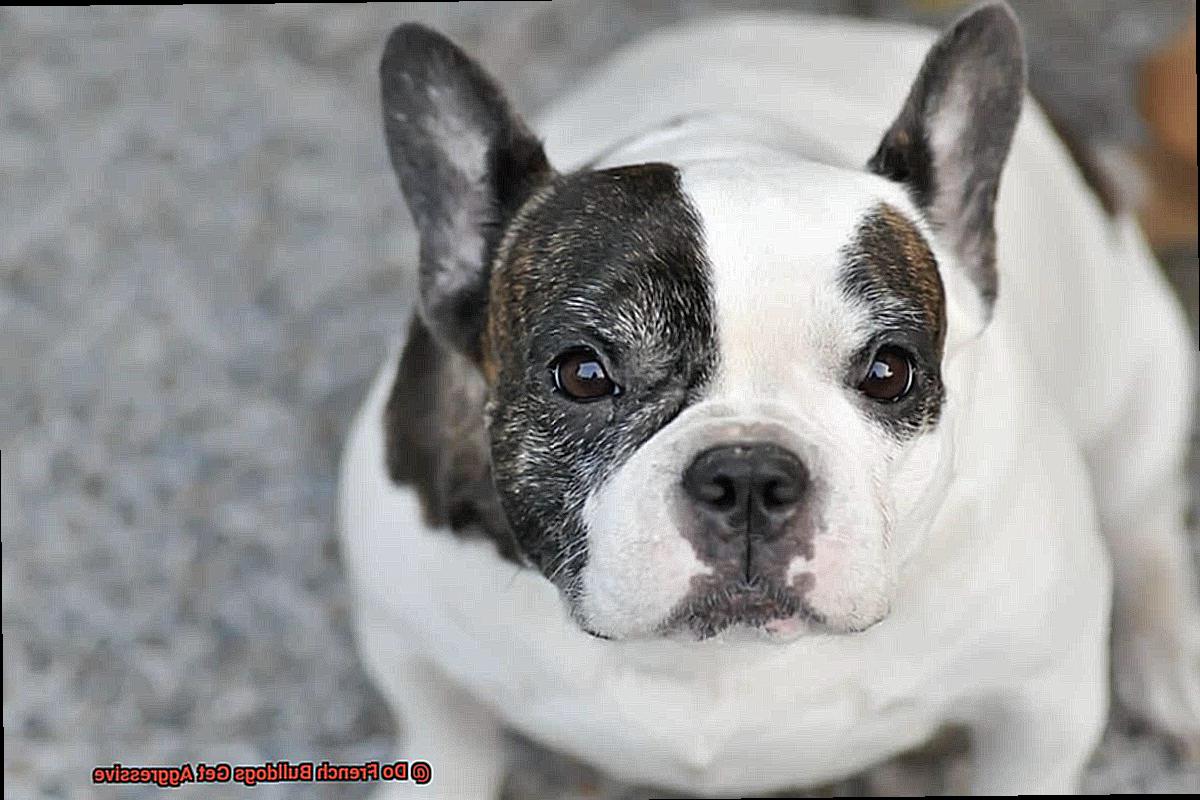
Lack of Socialization and Aggression in French Bulldogs
If you’ve got one of these adorable pups as your furry companion, you already know how lovable and friendly they can be. But did you know that lack of socialization can sometimes lead to unexpected aggression? Don’t worry, though – I’ve got all the tips and tricks to help ensure your Frenchie stays as friendly as ever.
Why Socialization Matters
Just like humans, dogs need socialization to thrive. It’s like puppy school for manners and making friends. Without proper socialization, French Bulldogs may become fearful or anxious in new situations. And let me tell ya, a scared pup can sometimes resort to aggression to protect themselves.
Start Early, Start Strong
The key to preventing aggression in French Bulldogs is starting socialization early. Between 3 and 14 weeks old is the critical period when they’re most receptive to new experiences. This is the time to expose them to different people (yes, even little humans.), other dogs, various environments, sounds, and surfaces. The more positive experiences they have during this period, the better-adjusted they’ll be later on.
Rewards Make the World Go Round
Positive reinforcement is a powerful tool in socializing French Bulldogs. When you expose your Frenchie to new situations and they handle it like a champ, shower them with treats, praise, and playtime. This helps them associate positive experiences with new things and builds their confidence.
Keep the Social Train Rolling
Socialization doesn’t stop after the critical period – it’s an ongoing process. Regular exposure to different environments and situations throughout their lives keeps them comfortable and well-adjusted. Take them on walks in new neighborhoods, introduce them to other friendly dogs at the park, and invite people over for playdates. The more adventures they have, the happier and friendlier they’ll be.
When Aggression Persists
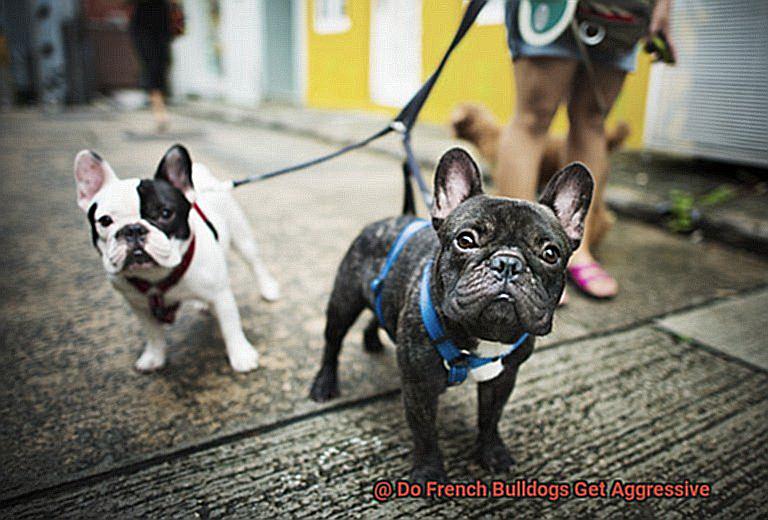
Now, sometimes aggression can stem from factors beyond just socialization. Genetics, past experiences, health issues, fear, or lack of training can also play a role. If you’re experiencing persistent aggression with your Frenchie, it’s important to seek professional help from a dog trainer or behaviorist who can provide targeted guidance.
Health Issues and Aggression in French Bulldogs
French Bulldogs are known for their friendly and affectionate nature, but like any breed, they can display aggression under certain circumstances. In this blog post, we will explore the correlation between health issues and aggression in French Bulldogs. Understanding these factors can help owners address potential triggers and provide the necessary care to ensure a well-balanced and happy pup.
Brachycephalic Syndrome:
French Bulldogs’ unique facial structure makes them prone to brachycephalic syndrome. This condition can lead to breathing difficulties, causing frustration and irritability, which may manifest as aggression. Regular veterinary check-ups, proper weight management, and keeping your Frenchie cool in hot weather can help mitigate these health concerns.
Allergies:
Allergies are another common health issue in French Bulldogs. Itchy skin and discomfort can make dogs more prone to reacting aggressively when they feel threatened or provoked. Identifying and managing allergens through a balanced diet, regular grooming, and veterinary guidance can help alleviate allergies and reduce aggressive behavior.
Hormonal Imbalances:
Hormonal imbalances, such as hypothyroidism, can affect a Frenchie’s mood and behavior, potentially leading to increased aggression. Regular blood tests and monitoring of hormone levels are essential for early detection and appropriate treatment.
Pain and Discomfort:
Pain from joint problems or dental issues can trigger aggression in French Bulldogs. Regular visits to the veterinarian for dental care, joint supplements, and appropriate pain management can help alleviate discomfort and minimize aggressive responses.
Genetic Predisposition:
While genetics play a role in a Frenchie’s temperament, it’s important to note that not all French Bulldogs will exhibit aggressive behavior solely based on their genetics. Aggression is typically a combination of genetic predisposition and other factors such as health issues or poor socialization. Responsible breeding practices and early socialization can help shape a Frenchie’s behavior positively.
Understanding Normal Canine Communication vs. Aggressive Behavior
French Bulldogs are known for their friendly and affectionate nature, but like any other breed, they can display aggressive behavior under certain circumstances. It is crucial for owners to be able to differentiate between normal canine communication and signs of aggression in order to properly address any behavioral issues and ensure the well-being of their beloved pets.
Normal Canine Communication
French Bulldogs, just like any other dog breed, communicate through a combination of body language, vocalizations, and overall behavior. Understanding these communication signals can help you decipher your Frenchie’s intentions accurately.
- Tail Wagging: A relaxed and loose tail wag is a sign of happiness and friendliness. It is important to note that not all tail wags are the same – a slow wag may indicate hesitation or uncertainty, while a fast wag with a raised tail can signal excitement.
- Relaxed Posture: When a French Bulldog is feeling comfortable, their body will appear loose and relaxed. They may have a slightly open mouth, soft eyes, and their weight evenly distributed on all four legs.
- Play Bows: One common way dogs initiate play is through a play bow. This involves lowering the front half of their body while keeping their hindquarters up in the air. It’s an invitation for interaction and a sign of good-natured playfulness.
- Friendly Approaches: When a French Bulldog approaches another dog or human in a calm and friendly manner, it is a positive sign of socialization and comfort.
Aggressive Behavior
Aggressive behavior in French Bulldogs can manifest in various ways and should be taken seriously to prevent any harm or escalation.
- Growling and Snarling: These vocalizations, accompanied by other aggressive behaviors such as baring teeth or stiffening of the body, indicate that your Frenchie is feeling threatened or defensive.
- Lunging or Biting: French Bulldogs may exhibit aggressive behavior by lunging towards a person or another animal, or even resorting to biting. This is a clear indication that they are feeling highly threatened or fearful.
Addressing Aggression in French Bulldogs
It is important to note that aggression in French Bulldogs is not necessarily a breed-specific trait. Like any other dog breed, they can exhibit aggressive behavior due to various reasons such as fear, pain, territoriality, or lack of socialization.
To address aggression in French Bulldogs effectively, it is crucial to identify the underlying cause and seek appropriate professional help if necessary. Here are some steps you can take:
- Consult with a Veterinarian: Aggression can sometimes be a result of underlying health issues. It is important to rule out any medical conditions that may be causing discomfort or pain for your Frenchie.
- Seek Professional Training: Enrolling your French Bulldog in obedience classes or working with a professional dog trainer can help address behavioral issues and provide guidance on how to manage aggression.
Seeking Professional Help for Aggressive French Bulldogs
French Bulldogs are known for their friendly and affectionate nature, but like any other dog breed, they can display aggression in certain situations. Aggression in French Bulldogs is not a common trait, but it can occur due to various factors such as genetics, improper socialization, fear, or health issues. Dealing with aggression in your French Bulldog can be challenging and potentially dangerous, which is why it is crucial to seek professional help from a qualified veterinarian or animal behaviorist who specializes in dog behavior.
The first step in seeking professional help for your aggressive French Bulldog is to schedule a thorough examination with your veterinarian. This is important to rule out any underlying medical conditions that may be causing or contributing to the aggression. Health issues such as pain or hormonal imbalances can affect a dog’s behavior and cause them to act aggressively. By addressing any potential medical causes, you can ensure that your dog receives the appropriate treatment.
Once any medical causes have been ruled out, a professional will conduct a behavioral assessment of your French Bulldog. This assessment aims to understand the triggers and context of the aggression. The professional may observe your dog’s behavior in different situations, interact with other dogs or people, and gather information about their history and environment. This assessment will help the professional develop a better understanding of your dog’s aggression and create a tailored treatment plan.
Based on the behavioral assessment, the professional will create a treatment plan that addresses the specific needs of your aggressive French Bulldog. This plan may include behavior modification techniques, training exercises, and management strategies. Behavior modification techniques focus on changing the emotional response of your dog by gradually exposing them to the triggers of aggression in a controlled and positive manner. This process, known as desensitization and counterconditioning, helps your dog develop new associations with previously fear-inducing stimuli.
Training exercises are an essential part of the treatment plan for aggressive French Bulldogs. These exercises aim to teach your dog alternative behaviors and reinforce calm and non-aggressive responses. Obedience training, impulse control exercises, and teaching appropriate greeting behaviors are some examples of training exercises that can help redirect your dog’s aggression.
In addition to behavior modification and training, management strategies play a crucial role in addressing aggression in French Bulldogs. These strategies focus on preventing situations that trigger aggression and ensuring the safety of everyone involved. Using tools such as muzzles or head halters during walks, creating a safe and quiet space for your dog at home, and implementing strict supervision and control measures are some management strategies that can be effective in managing aggression.
It is important to follow the guidance of the professional closely and be consistent with the recommended treatment plan. Resolving aggression issues takes time, patience, and commitment from the owner. It is also essential to understand that seeking professional help is not a sign of failure as a dog owner but rather a responsible and proactive approach to ensure the well-being of both your dog and the people around them.
Training and Positive Reinforcement Techniques to Manage Aggression
French Bulldogs are adorable and loving companions, but like any other breed, they may exhibit aggression if not properly trained and socialized. In this blog post, we will explore the effective training and positive reinforcement techniques that can help you manage aggression in your French Bulldog. So, grab a treat for your furry friend and let’s dive in.
Establishing Yourself as the Pack Leader:
French Bulldogs are pack animals, so it is crucial to establish yourself as their pack leader. By consistently training your dog, setting boundaries, and providing clear rules and expectations, you can gain their respect and trust. This will help in managing their aggression and ensuring a harmonious relationship.
Positive Reinforcement is Key:
Positive reinforcement techniques work wonders when training French Bulldogs. Instead of punishing undesirable behavior, focus on rewarding good behavior. Praise your dog, offer treats or toys, or use clicker training methods to reinforce desired behaviors. Positive reinforcement not only motivates French Bulldogs but also strengthens the bond between you and your furry friend.
Socialization for Confidence Building:
Socialization is a vital aspect of managing aggression in French Bulldogs. Introduce them to various people, animals, and environments from a young age to help them become comfortable and confident in different situations. Start with controlled interactions and gradually increase exposure as your dog becomes more at ease. This will reduce fear-based aggression and territorial behavior.
Mental and Physical Stimulation:
French Bulldogs are intelligent dogs that need mental and physical stimulation to prevent behavioral issues, including aggression. Regular exercise, interactive toys, and engaging activities can channel their energy positively and prevent frustration or boredom-related aggression. Remember, a tired dog is a happy dog.
Seeking Professional Help:
In some cases, aggressive behavior may persist despite your best efforts. If this happens, don’t hesitate to seek professional help from a certified dog trainer or animal behaviorist. They can assess the underlying causes of aggression and create a tailored training plan for your French Bulldog. Remember, you are not alone in this journey, and seeking professional guidance can make a world of difference.
Conclusion
In conclusion, it is important to note that while French Bulldogs have a reputation for being friendly and affectionate, they can exhibit aggressive behavior in certain circumstances.
This aggression can be triggered by factors such as fear, territoriality, or lack of socialization. It is crucial for owners to provide proper training and socialization from an early age to prevent aggression issues.
By taking these proactive measures and providing a loving and structured environment, owners can help ensure that their French Bulldogs remain well-behaved companions.




